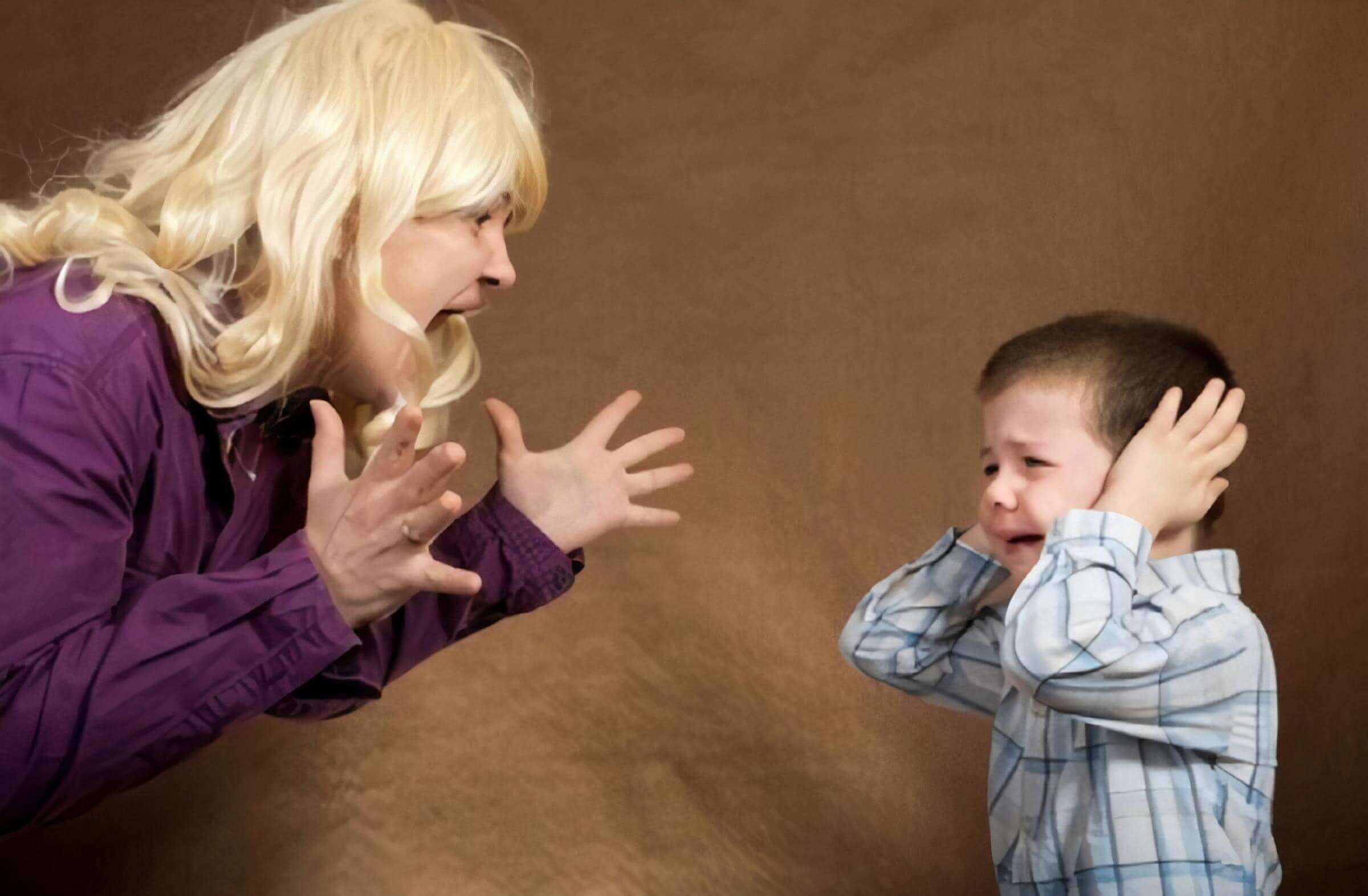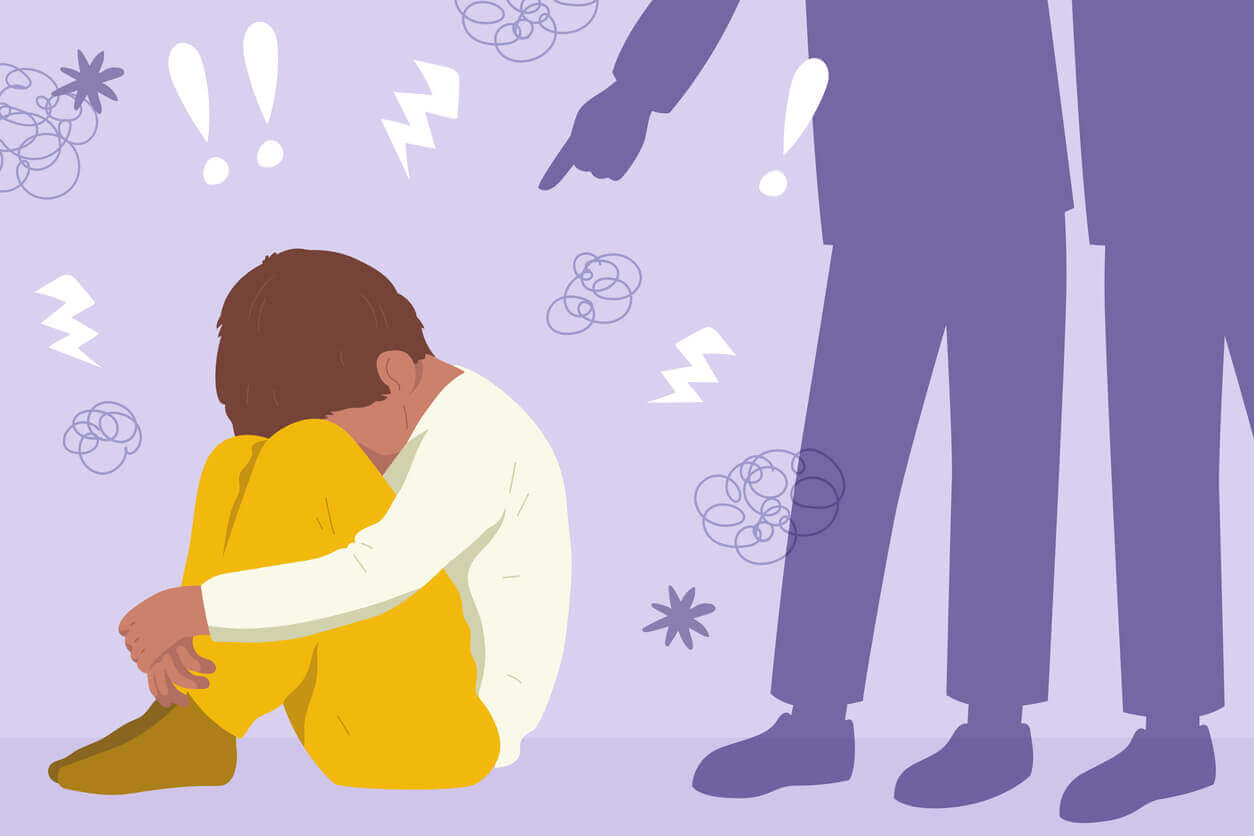14 Phrases that You Shouldn't Say to a Child Who's Afraid

It’s common for children to experience fears at different moments, and it’s important that we adults know how to respond appropriately. With that in mind, we want to tell you about 14 phrases that you shouldn’t say to a child who’s afraid.
Fear is an emotion that’s triggered when a person feels that they’re in danger or under threat. It increases the production of cortisol, the stress hormone, to prepare us for fight or flight. When a person’s afraid, their pulse races, sweating increases, and their pupils dilate. This emotion is instinctive and, thanks to it, humanity has managed to survive.
Sometimes fear occurs without a specific threatening stimulus, although it elicits the same reaction. For this reason, your child may be afraid of something that doesn’t scare you or that you know is harmless.
What happens is that between 3 and 6 years old, children go through a phase of irrational fears because they still don’t know how to distinguish well between imagination and fantasy.
Your children need your support to be able to face their fears, and to help them do so, we’ve put together a compilation of phrases that you shouldn’t say to a child that’s afraid. Keep reading!
What not to say to a child who’s afraid
Usually, parents use certain phrases to calm their children when they’re afraid. However, many times, we make the situation worse without realizing it. Let’s see what phrases we shouldn’t say to a fearful child.
1. “It’s not that big of a deal“
This phrase detracts from their emotions and should be avoided in any context. It may not be anything to you, but it causes the child discomfort.
Even if you think that their fear’s not important, when you say this phrase, the only thing that you make the child understand is that their emotions aren’t valid and that they must repress them. This, in the future, can cause them serious emotional problems.

2. “Stop being afraid”
As much as you want your child to stop feeling afraid, it’s not okay to force them not to experience it.
You mustn’t forget that fear is an instinctive emotion that alerts us to danger. Although children can learn to control it with time, it’s not something they can shut off at the push of a button.
3. “You’re a coward”
Don’t ridicule your child because they’re afraid or laugh at him for that reason. Nobody likes to be laughed at for being afraid of something.
What the child needs is for you to validate their emotions, understand them, and be by their side. Help them develop strategies for coping with fear rather than trying to hide it.
4. “Don’t be afraid”
Even if you don’t like seeing your child upset because of fear and try to convince them that there’s nothing to be afraid of, they won’t stop feeling insecure. Fear is a natural emotion and you have to see it as such.
Instead of telling them not to be afraid, tell them that they’re very brave. This will comfort them and make them feel much better.
5. “I’m going to get angry if you keep up like this”
Threatening children is neither good nor advisable in any situation. In fact, in the face of fear, this phrase doesn’t instill more courage, but quite the opposite. You make them understand that fear is a bad emotion and that they should be ashamed to feel it. Or worse, that their parents are ashamed of them for how they feel.
6. “Are you really scared of that? Aren’t you embarrassed?”
If you say this phrase, what you’ll achieve is that your child won’t come to you when they’re afraid of something. In addition to feeling insecure, they’ll be ashamed of their own genuine emotions.
7. “The reason for your fear is nonsense”
It may seem silly to you, but it isn’t to your child. If you say this to your child, they’ll think that their emotions really are silly and that they must suppress them. But as we’ve said before, you have to validate their emotions so that they feel understood.
Let them tell you why they’re afraid of something and support him!
8. “You’re acting like a little girl”
Is fear just a girlish emotion? Of course not. It’s an emotion that every human being has the right to feel.
No matter how angry you are, you should never say this phrase to your child.
9. “Don’t be afraid, that shot won’t hurt you”
It’s not good to lie to children so that they stop being afraid, because the only thing that will do is keep your child from trusting you in the future.
Shots can cause pain to anyone and lying isn’t the best way to overcome them.
10. “Close your eyes and go to sleep again”
Although children have to face their fears, they need help at first. Therefore, if they have had a nightmare and are afraid, go to them, hug them, and talk to them for a while. This will help them think about something else, comfort them, and allow them to feel better and more relaxed.
11. “Don’t cry over nothing!”
This is another phrase that detracts from their emotions and encourages kids to repress them. It causes them to understand that their emotions don’t matter, when for them, they do.
12. “Don’t cry, men aren’t afraid”
Since when is fear only a thing of women or girls? Let’s leave these stereotypes behind and give value to emotions, no matter who’s feeling them.
This is a phrase that denies children the possibility of expressing what they feel and that, simply because they’re boys, they can’t fear anything. This is a big mistake and you shouldn’t fall for it.
13. “Don’t exaggerate! It’s not that bad!”
Devaluing their fear will only cause the child to become frustrated and stressed, which can lead to aggressive behavior.
14. “You have to be strong”

From generation to generation, we’ve been taught that we shouldn’t accept our fear and that we should downplay this emotion. But if we do, we stop being empathic with the different realities of life.
Regarding the phrases that you shouldn’t say to a child who’s afraid
These phrases that we’ve given you in this article should never be said to a child who’s afraid, because you won’t be helping them at all. You’ll be doing quite the opposite.
When a child feels fear, they need support to overcome it, and this implies security, trust, tranquility, a lot of love, and understanding on your part.
Change your repertoire of phrases and thereby keep these fears from being prolonged and producing phobias or anxiety in the future.
It’s common for children to experience fears at different moments, and it’s important that we adults know how to respond appropriately. With that in mind, we want to tell you about 14 phrases that you shouldn’t say to a child who’s afraid.
Fear is an emotion that’s triggered when a person feels that they’re in danger or under threat. It increases the production of cortisol, the stress hormone, to prepare us for fight or flight. When a person’s afraid, their pulse races, sweating increases, and their pupils dilate. This emotion is instinctive and, thanks to it, humanity has managed to survive.
Sometimes fear occurs without a specific threatening stimulus, although it elicits the same reaction. For this reason, your child may be afraid of something that doesn’t scare you or that you know is harmless.
What happens is that between 3 and 6 years old, children go through a phase of irrational fears because they still don’t know how to distinguish well between imagination and fantasy.
Your children need your support to be able to face their fears, and to help them do so, we’ve put together a compilation of phrases that you shouldn’t say to a child that’s afraid. Keep reading!
What not to say to a child who’s afraid
Usually, parents use certain phrases to calm their children when they’re afraid. However, many times, we make the situation worse without realizing it. Let’s see what phrases we shouldn’t say to a fearful child.
1. “It’s not that big of a deal“
This phrase detracts from their emotions and should be avoided in any context. It may not be anything to you, but it causes the child discomfort.
Even if you think that their fear’s not important, when you say this phrase, the only thing that you make the child understand is that their emotions aren’t valid and that they must repress them. This, in the future, can cause them serious emotional problems.

2. “Stop being afraid”
As much as you want your child to stop feeling afraid, it’s not okay to force them not to experience it.
You mustn’t forget that fear is an instinctive emotion that alerts us to danger. Although children can learn to control it with time, it’s not something they can shut off at the push of a button.
3. “You’re a coward”
Don’t ridicule your child because they’re afraid or laugh at him for that reason. Nobody likes to be laughed at for being afraid of something.
What the child needs is for you to validate their emotions, understand them, and be by their side. Help them develop strategies for coping with fear rather than trying to hide it.
4. “Don’t be afraid”
Even if you don’t like seeing your child upset because of fear and try to convince them that there’s nothing to be afraid of, they won’t stop feeling insecure. Fear is a natural emotion and you have to see it as such.
Instead of telling them not to be afraid, tell them that they’re very brave. This will comfort them and make them feel much better.
5. “I’m going to get angry if you keep up like this”
Threatening children is neither good nor advisable in any situation. In fact, in the face of fear, this phrase doesn’t instill more courage, but quite the opposite. You make them understand that fear is a bad emotion and that they should be ashamed to feel it. Or worse, that their parents are ashamed of them for how they feel.
6. “Are you really scared of that? Aren’t you embarrassed?”
If you say this phrase, what you’ll achieve is that your child won’t come to you when they’re afraid of something. In addition to feeling insecure, they’ll be ashamed of their own genuine emotions.
7. “The reason for your fear is nonsense”
It may seem silly to you, but it isn’t to your child. If you say this to your child, they’ll think that their emotions really are silly and that they must suppress them. But as we’ve said before, you have to validate their emotions so that they feel understood.
Let them tell you why they’re afraid of something and support him!
8. “You’re acting like a little girl”
Is fear just a girlish emotion? Of course not. It’s an emotion that every human being has the right to feel.
No matter how angry you are, you should never say this phrase to your child.
9. “Don’t be afraid, that shot won’t hurt you”
It’s not good to lie to children so that they stop being afraid, because the only thing that will do is keep your child from trusting you in the future.
Shots can cause pain to anyone and lying isn’t the best way to overcome them.
10. “Close your eyes and go to sleep again”
Although children have to face their fears, they need help at first. Therefore, if they have had a nightmare and are afraid, go to them, hug them, and talk to them for a while. This will help them think about something else, comfort them, and allow them to feel better and more relaxed.
11. “Don’t cry over nothing!”
This is another phrase that detracts from their emotions and encourages kids to repress them. It causes them to understand that their emotions don’t matter, when for them, they do.
12. “Don’t cry, men aren’t afraid”
Since when is fear only a thing of women or girls? Let’s leave these stereotypes behind and give value to emotions, no matter who’s feeling them.
This is a phrase that denies children the possibility of expressing what they feel and that, simply because they’re boys, they can’t fear anything. This is a big mistake and you shouldn’t fall for it.
13. “Don’t exaggerate! It’s not that bad!”
Devaluing their fear will only cause the child to become frustrated and stressed, which can lead to aggressive behavior.
14. “You have to be strong”

From generation to generation, we’ve been taught that we shouldn’t accept our fear and that we should downplay this emotion. But if we do, we stop being empathic with the different realities of life.
Regarding the phrases that you shouldn’t say to a child who’s afraid
These phrases that we’ve given you in this article should never be said to a child who’s afraid, because you won’t be helping them at all. You’ll be doing quite the opposite.
When a child feels fear, they need support to overcome it, and this implies security, trust, tranquility, a lot of love, and understanding on your part.
Change your repertoire of phrases and thereby keep these fears from being prolonged and producing phobias or anxiety in the future.
All cited sources were thoroughly reviewed by our team to ensure their quality, reliability, currency, and validity. The bibliography of this article was considered reliable and of academic or scientific accuracy.
- Méndez, F. X., Inglés, C. J., Hidalgo, M. D., García-Fernández, J. M., & Quiles, M. J. (2003). Los miedos en la infancia y la adolescencia: un estudio descriptivo. Revista Electrónica de Motivación y Emoción, 6(13), 150-163. Disponible en: https://www.researchgate.net/profile/Candido-Ingles/publication/28062475_Los_miedos_en_la_infancia_y_la_adolescencia_Un_estudio_descriptivo/links/5dcde0fd4585156b3513705d/Los-miedos-en-la-infancia-y-la-adolescencia-Un-estudio-descriptivo.pdf
- Valiente, R. M., Sandín, B., & Chorot, P. (2002). Miedos comunes en niños y adolescentes: Relación con la sensibilidad a la ansiedad, el rasgo de ansiedad, la afectividad negativa y la depresión. Revista de psicopatología y Psicología clínica, 7(1), 61-70. Disponible en: http://revistas.uned.es/index.php/RPPC/article/view/3922
- del Agua, A. M. P. (1995). La importancia de la edad en la evolución de los miedos infantiles. Revista de psicología general y aplicada: Revista de la Federación Española de Asociaciones de Psicología, 48(3), 365-375.
This text is provided for informational purposes only and does not replace consultation with a professional. If in doubt, consult your specialist.








